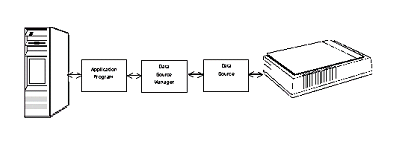

TWAIN was developed by a consortium of software and hardware manufacturers to standardize the communication between software applications and image acquisition devices. The interface is optimized for acquisition of graphic images. The TWAIN standard is widely supported by scanner manufacturers, with the widely used version of TWAIN being 1.9 (as of this writing). In addition to scanners, TWAIN is being used with digital cameras and video capture boards. ImageGear supports all three TWAIN Transfer Modes: Native Data Transfer Mode (which is the TWAIN default), Disk File Transfer, and Buffered Memory.
A TWAIN-compliant image acquisition device is one whose device driver complies with TWAIN specification. The device driver understands the TWAIN protocol, thus allowing interaction with the Data Source Manager, the main interface module of the TWAIN software. The Data Source Manager "manages the session" between the application program and the raster-generating data source. Three software elements work together in TWAIN: the application, the Data Source (DS), and the Data Source Manager (DSM) as shown below:

This section uses the following terminology when discussing ImageGear scanning functionality:
The TWAIN Data Source for your device and the TWAIN Data Source Manager should be included as part of your scanner software. They are not part of the ImageGear software.
ImageGear supports TWAIN 1.6, 1.7, 1.8, and 1.9, working with a wide variety of scanner devices, digital cameras, and video capture boards. No TWAIN toolkit is easier or more comprehensive.
The TWAIN version may be verified by using the function IG_TWAIN_driver_info_get(). This function returns two integer values: one for the major release number, and the other for the minor release number. The example code provided with your product includes a call to this function.
ImageGear includes a wide array of methods, providing the developer with detailed control of the scanning process, including control of the following:
ImageGear provides flexibility in working with TWAIN. This section provides an overview of all of the ways in which you may shape your sessions with TWAIN.